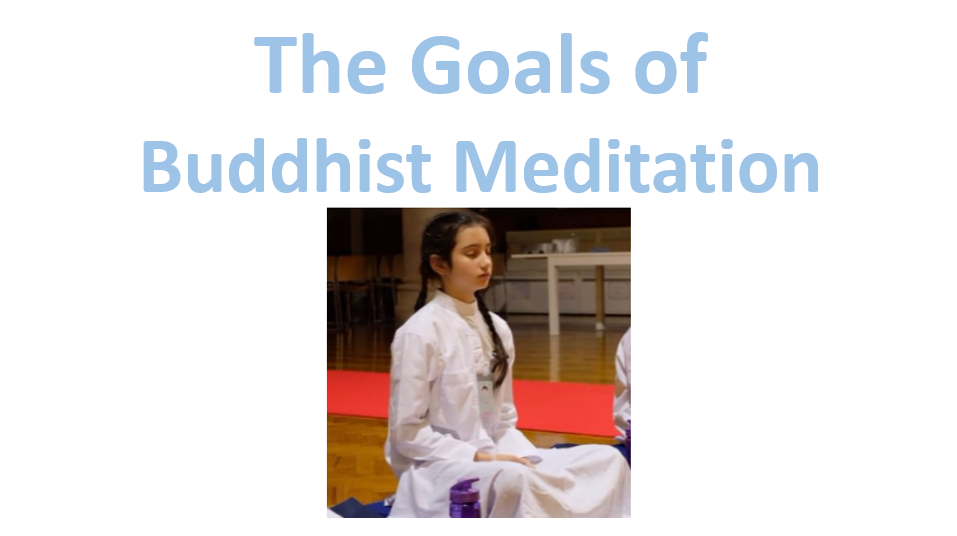Buddhism EP. 16 : The Goals of Buddhist Meditation !?!
Buddhist Meditation aims to clean the impurities and disturbances of the mind, to gain tranquility and wisdom. http://winne.ws/n25296
Let’s study together thru the conversation of the students who really need to know about “Buddhism”
Pim : Excuse me, Ronny. Are you a
Christian?
Ronny : Well, my mother is a devout
Catholic but my father is Jewish.
When I was young, my mother
took me to church with her.
Sometimes I accompanied my
father when he went to have
a talk with a rabbi attemple.
These experiences have caused
me to get interested in
comparative religions.
Unfortunately, I can’t afford
much time for studying.
However, reading a book on
Buddhism made me wish to
experience Buddhist
meditation.
Pim : I’ve heard that there is
meditation practice in
Christianity. Is this true?
Ronny : Yes, the way they meditate
is to say a prayer toGod.
Most Christians believe that
through deep meditation
they will receive messages
from God.
Pim : That’s completely different
from Buddhist meditation.
You said that you wished
to experience Buddhist
meditation. May I ask why?
I mean, how you view
Buddhist meditation?
Ronny : From the book I read, I
understand that through
meditation practice one will
gain not only job and
tranquility but also some
spiritual powers.
Pim : Well, first of all, I think you
should have the right
perspective on Buddhist
meditation. In Buddhism, the
mind is the most important
component of the entire
human entity. All the evil
noble deeds committed in
the world are actually a
result of human thoughts.
Thoughts are also the main
cause of human happiness or
unhappiness. That is why the
Buddha has repeatedly
proclaimed that the mind is
the forerunner of all actions,
the source of all things. It
must therefore be trained,
refined and perfected. The
method to achieve this is
meditation practice. In other
words, Buddhist meditation
aims at cleansing the
impurities and disturbances
of the mind so as to gain
tranquility and wisdom.
As soon as wisdom arises,
craving and ignorance
disappear. The meditators
who are able to make their
craving and ignorance extinct
will attain the ultimate
freedom.
Ronny : Do they gain any spiritual
powers?
Pim : Yes, they do. That is a by-
product, not the goal.
Ronny : I understand that there are
many types of mediation.
Pim : Actually, there are only two
levels of meditation:
one is the development of
mental concentration known
in Pali as Samathabhavana,
the other is insightmeditation
known as Vipassanabhavana.
Ronny : What is the difference
between these two levels of
meditation?
Pim : Well, Samathabhavana is
the practice of concentrating
the mind. This will lead to
tranquility. It is the foundation
of Vipassanabhavana or insight
meditation which leads to
wisdom, to the realization of
the ultimate truth and nirvana
nirvana - the ultimate goal of
Buddhism.
Ronny : What does “nirvana” mean?
Does it refer to paradise?
Pim : No, it doesn’t. In Buddhism,
nirvana means the extinction
of all defilements and
suffering. It refers to a state
of mind that is absolutely
pure - free from craving,
defilements, ignorance, and
a state from which one will
not be reborn in the cycle
of existence again. There
are 2 types of nirvana:
one relates to physical
existence, the other is
without any remainder of
physical existence.
Ronny : It’s quite hard to understand
Buddhist texts because of
the many technical tersm.
Pim : You can succeed in meditating
without understanding any
Buddhist texts. What you
have to do is just follow the
instructions in this booklet -
I am pleased to give it to you.
Ronny : Thank you very much.
Pim : You are welcome.
It is my pleasure…
Thanks & regards : AJ S. Srisopa (Cr. All Dhamma teachers)












